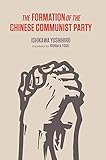The Formation of the Chinese Communist Party / Yoshihiro Ishikawa.
Material type: TextPublisher: New York, NY : Columbia University Press, [2012]Copyright date: ©2012Description: 1 online resource (520 p.) : ‹B›Halftones: ‹/B›11Content type:
TextPublisher: New York, NY : Columbia University Press, [2012]Copyright date: ©2012Description: 1 online resource (520 p.) : ‹B›Halftones: ‹/B›11Content type: - 9780231158084
- 9780231504164
- 155 21
- JQ1519.A5 I8213 2013
- BF713 .D469 2002eb
- online - DeGruyter
- Issued also in print.
| Item type | Current library | Call number | URL | Status | Notes | Barcode | |
|---|---|---|---|---|---|---|---|
 eBook
eBook
|
Biblioteca "Angelicum" Pont. Univ. S.Tommaso d'Aquino Nuvola online | online - DeGruyter (Browse shelf(Opens below)) | Online access | Not for loan (Accesso limitato) | Accesso per gli utenti autorizzati / Access for authorized users | (dgr)9780231504164 |
Frontmatter -- Contents -- Figures and Tables -- Introduction to the English Edition -- 1. The Reception of Marxism in China -- 2. Soviet Russia, the Comintern, and the Chinese Communist Movement -- 3. Toward the Formation of the Chinese Communist Party -- 4. The First National Congress of the Chinese Communist Party -- Afterword -- APPENDIX 1. Chinese Translations from Japanese of Works on Socialism, 1919-1922 -- APPENDIX 2. Explanation of Chinese Books Concerning Socialism, 1919-1923 -- APPENDIX 3. Shi Cuntong's Deposition -- Abbreviations -- Notes -- Bibliography -- Index -- Backmatter
restricted access online access with authorization star
http://purl.org/coar/access_right/c_16ec
Official Chinese narratives recounting the rise of the Chinese Communist Party (CCP) tend to minimize the movement's international associations. Conducting careful readings and translations of recently released documents in Russian, Japanese, and Chinese, Ishikawa Yoshihiro builds a portrait of the party's multifaceted character, revealing the provocative influences that shaped the movement and the ideologies of its competitors.Making use of public and private documents and research, Ishikawa begins the story in 1919 with Chinese intellectuals who wrote extensively under pen names and, in fact, plagiarized or translated many iconic texts of early Chinese Marxism. Chinese Marxists initially drew intellectual sustenance from their Japanese counterparts, until Japan clamped down on leftist activities. The Chinese then turned to American and British sources. Ishikawa traces these networks through an exhaustive survey of journals, newspapers, and other intellectual and popular publications. He reports on numerous early meetings involving a range of groups, only some of which were later funneled into CCP membership, and he follows the developments at Soviet Russian gatherings attended by a number of Chinese representatives who claimed to speak for a nascent CCP. Concluding his narrative in 1922, one year after the party's official founding, Ishikawa clarifies a traditionally opaque period in Chinese history and sheds new light on the subsequent behavior and attitude of the party.
Issued also in print.
Mode of access: Internet via World Wide Web.
In English.
Description based on online resource; title from PDF title page (publisher's Web site, viewed 02. Mrz 2022)


